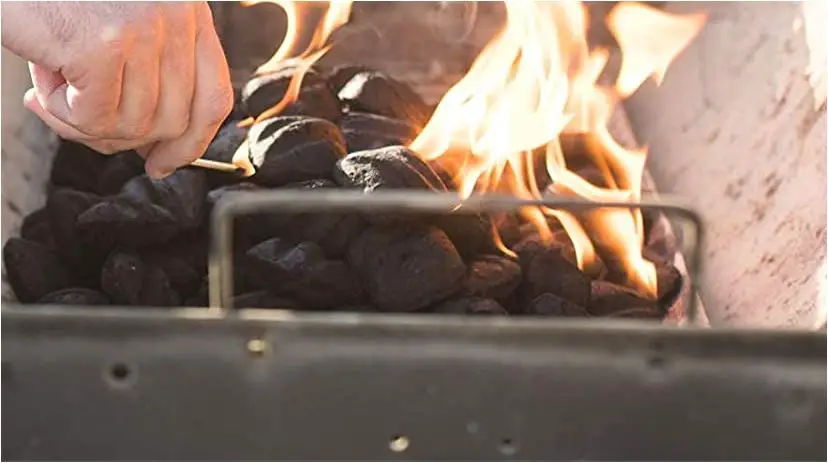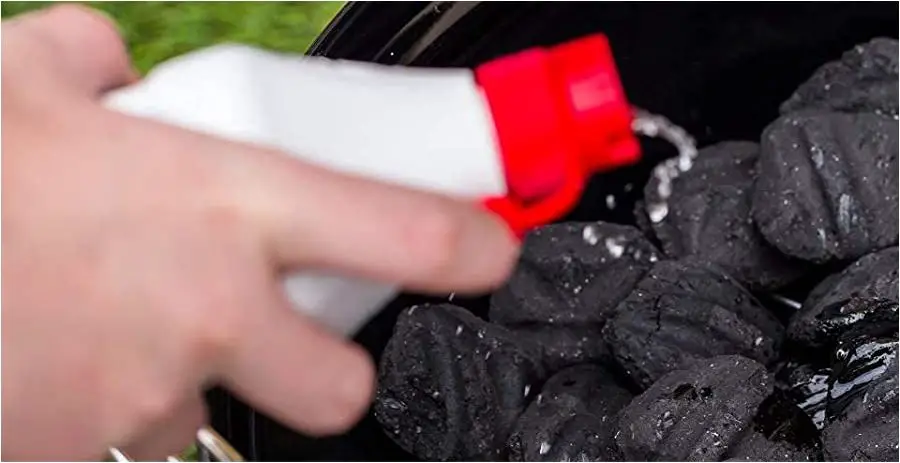Note: This article may contain affiliate links, which means if you make a purchase following our links won’t cost you extra, but we may earn a commission. Learn more
Charcoal lighter fluid is a popular choice for igniting charcoal briquettes or lump charcoal in grills and barbecues. Some people wonder if kerosene can be used as an alternative. Kerosene, a petroleum-based fuel, has been used for various purposes, including heating and lighting. But is it suitable for lighting charcoal?
While kerosene can ignite charcoal, it is not recommended due to safety concerns and potential flavor alterations. Charcoal lighter fluid is specifically designed for this purpose, ensuring a safe and efficient ignition process. In contrast, kerosene has a higher flash point and can produce a more volatile flame, increasing the risk of accidents. Moreover, kerosene can impart an unpleasant taste to the food being cooked, affecting the overall grilling experience.
To use lighter fluid for charcoal, simply squirt a small amount onto the charcoal pile, allowing it to soak in for a few minutes before igniting with a long match or lighter. This method provides a controlled flame and minimizes the risk of flare-ups.
For those seeking a more natural alternative, vegetable oil can be used to light charcoal. Soak a paper towel or cotton ball in vegetable oil and place it under the charcoal. Light the oil-soaked material, and the charcoal will gradually catch fire. This method is safer and imparts no unwanted flavors to the food.
Learn More: Can You Burn Waste Oil In A Fuel Oil Furnace?
What Is Charcoal Lighter Fluid? How Does It Work?
Charcoal lighter fluid is a combustible liquid specifically designed to ignite charcoal briquettes or lump charcoal in grills and barbecues. It is typically made from a mixture of petroleum-based hydrocarbons, such as naphtha or mineral spirits, and often contains additives to improve ignition and reduce smoke production.
The production process of charcoal lighter fluid involves refining and distilling crude oil to separate the desired hydrocarbon components. These components are then blended with additives to create a product that is both efficient and safe for its intended purpose.

Combustion occurs when a fuel, in this case, the lighter fluid, reacts with oxygen in the air to produce heat and light. The lighter fluid’s hydrocarbons vaporize when exposed to heat, creating a flammable vapor-air mixture.
Upon ignition, the heat generated by the burning lighter fluid transfers to the charcoal, causing it to ignite and produce a steady, consistent heat source for grilling.
To use charcoal lighter fluid, arrange the charcoal in a pile or pyramid shape, ensuring adequate airflow. Apply the lighter fluid evenly over the charcoal, allowing it to soak in for a few minutes.
Ignite the charcoal using a long match or lighter, and let the lighter fluid burn off completely before placing food on the grill. This ensures a clean, smoke-free grilling experience.
Read More: 5 Best Penetrating Oils For Seized Engine
Is Charcoal Lighter Fluid Kerosene?
Charcoal lighter fluid and kerosene are not the same, although both are petroleum-based products. As mentioned earlier, charcoal lighter fluid is a blend of hydrocarbons specifically designed for igniting charcoal.
Kerosene, on the other hand, is a fuel commonly used for heating, lighting, and even jet engines. It has a higher flash point and a different chemical composition compared to charcoal lighter fluid.
While kerosene can ignite charcoal, it is not recommended due to safety concerns and potential flavor alterations. Using charcoal lighter fluid or a natural alternative is a safer and more effective option for lighting charcoal.
Can You Use Kerosene to Light Charcoal?
1. Kerosene has a higher flash point, which means it requires more heat to ignite. This can result in a more volatile flame and increase the risk of accidents.
2. Kerosene can impart an unpleasant taste to the food being cooked, affecting the overall grilling experience.
Instead of using kerosene, opt for charcoal lighter fluid or a natural alternative like vegetable oil or alcohol-based fire starters. These options provide a controlled flame, minimize the risk of flare-ups, and do not alter the taste of the food. To ensure a safe and enjoyable grilling experience, it is best to avoid using kerosene to light charcoal.
Charcoal Lighter Fluid vs Kerosene
Charcoal lighter fluid and kerosene are both flammable liquids commonly used to start charcoal grills and smokers. However, they are not interchangeable. Kerosene is not recommended for use as a charcoal lighter fluid substitute.
The reason being, kerosene is a petroleum product that contains chemicals that can contaminate food and produce a foul taste and odor. It is also more volatile than charcoal lighter fluid, making it dangerous to use for this purpose.
On the other hand, charcoal lighter fluid is specifically designed for lighting charcoal and is generally safe when used according to instructions.
It evaporates quickly, leaving behind no residue or taste, which makes it ideal for grilling and smoking. It also burns at a lower temperature than kerosene, allowing the charcoal to heat up more evenly and prevent flare-ups.
How to Use Lighter Fluid for Charcoal?
Using charcoal lighter fluid is a straightforward process, but it requires some precautions to ensure safety. Here are the steps to follow:
- Arrange the charcoal in a pyramid shape in the center of the grill
- Shake the charcoal lighter fluid container and squirt enough fluid over the coals to saturate them. The amount of fluid required may vary depending on the grill size and the amount of charcoal used
- Wait for about a minute to let the lighter fluid soak into the charcoal
- Carefully ignite the coals with a match or lighter. Stand back and avoid leaning over the grill during ignition
- Once the coals are lit, let them burn for about 10-15 minutes until they turn gray and ashy
- Spread the coals evenly across the grill and begin cooking.
Remember to follow the instructions on the lighter fluid container and avoid overusing it. Also, keep the lighter fluid away from heat sources and children.

Charcoal Lighter Fluid Alternative
If you prefer not to use charcoal lighter fluid or want a more natural option, there are several alternatives you can use:
Chimney starter: A chimney starter is a metal cylinder that allows you to light charcoal using newspaper or lighter cubes without any lighter fluid.
Electric charcoal starter: An electric starter is a heating element that ignites the charcoal without using lighter fluid. It requires an electric outlet.
Looftlighter: A Looftlighter is a device that uses hot air to ignite the charcoal without lighter fluid or electricity. It requires a few minutes to heat the charcoal.
Using an alternative to charcoal lighter fluid eliminates the risk of contaminating food with chemicals and provides a more natural way to start the charcoal. Additionally, it can be a safer option as it reduces the risk of flare-ups and accidents.
FAQs
Can you use kerosene to light charcoal?
No, it is not recommended to use kerosene as a charcoal lighter fluid substitute. Kerosene contains chemicals that can contaminate food and produce a foul taste and odor.
Is charcoal lighter fluid safe to use?
Yes, charcoal lighter fluid is generally safe when used according to instructions. It evaporates quickly, leaving behind no residue or taste, which makes it ideal for grilling and smoking.
How much charcoal lighter fluid should I use?
The amount of lighter fluid required may vary depending on the grill size and the amount of charcoal used. It is recommended to follow the instructions on the lighter fluid container and avoid overusing it.
How do I light charcoal with lighter fluid?
Arrange the charcoal in a pyramid shape in the center of the grill. Shake the lighter fluid container and squirt enough fluid over the coals to saturate them. Wait for about a minute to let the lighter fluid soak into the charcoal. Carefully ignite the coals with a match or lighter.
Can I use an alternative to charcoal lighter fluid?
Yes, there are several alternatives you can use, such as a chimney starter, electric charcoal starter, or Looftlighter. They eliminate the risk of contaminating food with chemicals and provide a more natural way to start charcoal.
Can I use lighter fluid to start a wood fire?
No, lighter fluid is not recommended for starting wood fires. It is designed specifically for lighting charcoal and can produce dangerous and unpredictable flames when used with wood.
Is there a risk of flare-ups when using charcoal lighter fluid?
There is a risk of flare-ups when using charcoal lighter fluid if it is overused or applied to already lit coals. It is important to follow the instructions on the lighter fluid container and use it only as directed.
